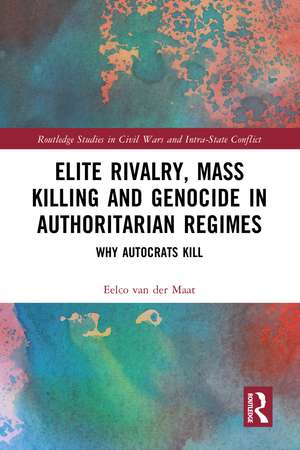Elite Rivalry, Mass Killing and Genocide in Authoritarian Regimes: Why Autocrats Kill: Routledge Studies in Civil Wars and Intra-State Conflict
Autor Eelco van der Maaten Limba Engleză Hardback – 18 iun 2024
Mass killing and genocide defy reason and explanation. How can genocidal elites present defenceless victims as an existential threat? Why use indiscriminate killing that drives victims to coordinated resistance? Mass killing seems counterproductive, irrational, and therefore inherently ideological. By building on new insights on authoritarian politics, this book argues that mass killing is not ideological, but instead is a rational response to elite rivalry within authoritarian regimes. Mass killing is therefore not driven by rivalries between groups, but by elite rivalry within groups. In Rwanda, for example, the genocide was not driven by conflicts between Hutu and Tutsi, but by conflicts within the Hutu regime. The work demonstrates how mass killing helps elites build coalitions with groups that benefit from violence and how it divides support coalitions of rival elites. Mass killing can therefore help elites win dangerous internal rivalries. By qualitatively and quantitatively exploring elite rivalry and mass killing, this book provides a new explanation for a host of mass killings and genocides. It demonstrates that well-known genocides, such as the Rwandan and Cambodian genocides, which are seemingly ideological are instead better explained by elite rivalry. Mass killing is therefore not driven by the random madness of leaders, nor by the desire to kill an outgroup, but by the internal threats that authoritarian elites face.
This book will be of much interest to scholars and students of civil wars, genocide, political violence, and International Relations in general.
Preț: 764.20 lei
Preț vechi: 1102.76 lei
-31% Nou
Puncte Express: 1146
Preț estimativ în valută:
146.27€ • 150.74$ • 123.49£
146.27€ • 150.74$ • 123.49£
Carte tipărită la comandă
Livrare economică 03-17 martie
Preluare comenzi: 021 569.72.76
Specificații
ISBN-13: 9780367529604
ISBN-10: 0367529602
Pagini: 212
Ilustrații: 18
Dimensiuni: 156 x 234 mm
Greutate: 0.45 kg
Ediția:1
Editura: Taylor & Francis
Colecția Routledge
Seria Routledge Studies in Civil Wars and Intra-State Conflict
Locul publicării:Oxford, United Kingdom
ISBN-10: 0367529602
Pagini: 212
Ilustrații: 18
Dimensiuni: 156 x 234 mm
Greutate: 0.45 kg
Ediția:1
Editura: Taylor & Francis
Colecția Routledge
Seria Routledge Studies in Civil Wars and Intra-State Conflict
Locul publicării:Oxford, United Kingdom
Public țintă
Postgraduate, Professional, and Undergraduate AdvancedNotă biografică
Eelco van der Maat is Assistant Professor of International Relations at Leiden University, the Netherlands.
Cuprins
1 Introduction 2 Insecure Authoritarianism 3 Mass Political Violence 4 A Theory of Genocidal Consolidation 5 Testing the Theory of Genocidal Consolidation 6 A Process of Genocidal Consolidation in Rwanda 7 Khmer Rivalry and the Cambodian Killing Fields 8 Rivalry and Ideology without Mass Killing in Ivory Coast 9 Conclusion
Recenzii
'Intra-regime elite conflict and genocide tend to co-occur. Why? Leveraging a nested research design that combines large-N analysis of elite rivalry, purges, and different types of mass killing with case studies of Rwanda, Cambodia, and Côte d’Ivoire, Eelco van der Maat illuminates the internal logic of mass indiscriminate violence—that rulers wield this devastating policy as much to restructure elite coalitions and secure power within their regimes as to eliminate threats from without. An insightful contribution that reveals how strategies of regime consolidation drive dictators towards the ruthless mobilization of genocidal violence.'
Philip Roessler, Professor of Government, William & Mary, USA
'Elite rivalries in authoritarian regimes sometimes result in mass killings, a process Eelco van der Maat describes as "genocidal consolidation." An original and well researched argument, it will be required reading for students of civil wars, genocide, and political violence more generally.'
Stathis N. Kalyvas, Gladstone Professor of Government, University of Oxford, UK
'As genocide and mass violence rage far and wide in today’s world, we are urgently seeking answers to the question why? Eelco van der Maat’s innovative book provides an answer—elite coalition-building and rivalry—and makes an important contribution to the literature.'
Alex Hinton, Center for the Study of Genocide and Human Rights, Rutgers University, USA
Philip Roessler, Professor of Government, William & Mary, USA
'Elite rivalries in authoritarian regimes sometimes result in mass killings, a process Eelco van der Maat describes as "genocidal consolidation." An original and well researched argument, it will be required reading for students of civil wars, genocide, and political violence more generally.'
Stathis N. Kalyvas, Gladstone Professor of Government, University of Oxford, UK
'As genocide and mass violence rage far and wide in today’s world, we are urgently seeking answers to the question why? Eelco van der Maat’s innovative book provides an answer—elite coalition-building and rivalry—and makes an important contribution to the literature.'
Alex Hinton, Center for the Study of Genocide and Human Rights, Rutgers University, USA
Descriere
This book explains how mass killing is driven by elite politics within authoritarian regimes.













